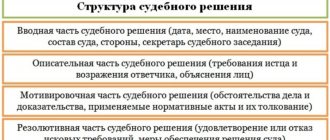Powers of the appellate court
To clarify the powers of the court of appeal, one should refer to the relevant procedural codes, which indicate that after the court has considered the appeal, it goes into a separate room, the so-called deliberative room, where only judges are present, and in which it makes a decision on the complaint, and exactly:
- leaves the act of the court of first instance in the form in which it was adopted, i.e. without changing it, and accordingly does not satisfy the complaint;
- may change or even cancel the decision made in the first instance and make a new decision on the case;
- The appealed decision may be canceled in whole or in part and terminate the case or leave the claim without consideration in whole or in part.
In addition to the above-mentioned powers of the court, the Code of Civil Procedure of the Russian Federation provides for one more, namely, to leave an appeal without consideration on the merits, in the case where it is filed after the deadline for appeal has expired and the issue of restoring this period has not been resolved.
In criminal cases, the appellate court can make the following decisions:
- leave the verdict or other judicial act unchanged, and, accordingly, do not satisfy the complaint;
- when overturning a conviction, render an acquittal;
- reversing a guilty verdict, pronounce another guilty verdict;
- overturn the verdict and transfer the case back to the court of first instance for a new trial;
- reversing an acquittal, render an acquittal;
- by canceling the procedural decision of the first instance, render a verdict of acquittal or make another decision;
- having canceled the court decision, return the case to the prosecutor;
- by canceling the judicial act, dismiss the case;
- change the sentence or other decision that is being appealed;
- terminate the appeal proceedings.
Useful: watch the VIDEO on the topic of appealing a court decision and subscribe to the YouTube channel to receive advice from a lawyer
The Supreme Court prohibited challenging prejudice
Prejudicial facts are those that the court does not question, since they were established in an act that came into force within the framework of another process. Such circumstances must apply to both cases and the same persons must be involved. In addition, the fact must be established by the courts before the resolution of the case in which it is stated, explains Boris Chirkov, lawyer at the law office Law Office "A2" Law Office "A2" Federal rating. group Land law/Commercial real estate/Construction group Arbitration proceedings (major disputes - high market) group Corporate law/Mergers and acquisitions Company profile. Delgira Khodzhaeva, junior lawyer at the firm Nadmitov, Ivanov and Partners Nadmitov, Ivanov and Partners Federal rating. adds: these circumstances must be of substantive and not procedural content. Moreover, the principle of prejudice cannot apply to decisions of administrative bodies.
Another important point that gives prejudicial significance to ordinary facts is that they must be examined by the court, says Khodzhaeva. In other words, if in a preliminary case the court did not evaluate a circumstance, the decision on it cannot be considered an “axiom” in another case.
The issue of prejudice periodically arises in loan cases, and two such cases were recently considered by the Supreme Court.
What has been proven cannot be disputed
In 2012, Vadim Khapaev* and Natalya Shapovalova* entered into a commodity loan agreement. According to its terms, Khapaev transferred woolen products worth 308,350 rubles to Shapovalova. She wrote a receipt in which she undertook to repay the loan on September 15, 2015. And Mikhail Kuleshov* undertook to reimburse 300,000 rubles if Shapovalova did not return this amount. The woman never returned this money, and Khapaev filed a lawsuit.
On December 5, 2021, the decision of the Cherkessk City Court of Karachay-Cherkessia came into force: the debt with interest was jointly collected from Kuleshov and Shapovalova - 586,343 rubles.
How it works: new terms, prejudices and other changes in the agrarian and industrial complex and civil procedure code
Kuleshov did not agree with this decision and filed a lawsuit against Khapaev. The plaintiff tried to recognize the guarantee agreement as terminated. In court, he argued that the term of the guarantee agreement was terminated already in 2013 - a year after its conclusion. During this time, no one approached him for money. In March 2019, the court satisfied Kuleshov’s demands only partially: it declared the contract terminated, but not from 2013, but from 2021. At the same time, the court found that Shapovalova actually incurred a debt with a repayment period of September 15, 2015, and that Kuleshov undertook to reimburse this amount as a guarantor.
The Supreme Court of the Karachay-Cherkess Republic overturned the decision of the first instance. The court noted that on the basis of judicial acts of 2018, the amount of debt was collected from Kuleshov, and he has no right to challenge these decisions.
On December 18, 2021, the Fifth Court of Cassation of General Jurisdiction overturned the decision of the appeal: they stated that the appeal did not consider the issue of the period for which the guarantee was issued. The cassation overturned the appeal ruling and upheld the decision of the first instance. Kuleshov went to appeal this decision to the Supreme Court of the Russian Federation.
The Supreme Court stated that since Kuleshov had previously participated in a debt collection case, he does not have the right to challenge the circumstances established by the court in this case in another trial. This also applies to the question of whether the guarantee agreement has terminated. The Supreme Court noted that the cassation did not take these facts into account and allowed to overcome the finality of the court decisions that entered into force. The Supreme Court considered this violation to be significant and upheld the decision of the appeal - the Supreme Court of the Karachay-Cherkess Republic, which rejected Kuleshov.
Time doesn't matter
Andrei Stavitsky*, according to him, lent Anton Prudkovsky* 7 million rubles in 2012. for five years to purchase real estate. But Stavitsky did not wait for the money to be returned. He went to court to collect the main debt, as well as 4 million rubles. percent. Prudkovsky objected. He indicated that he did not need funds. It was his own money, which he received to participate in auctions.
The main issue in the case is whether prejudice applies if the decision with established fact came into force later. In one of the trials, Prudkovsky tried to declare the loan agreement invalid and unconcluded, and there the court refused him and at the same time established that the money was transferred. The decision on this came into force on December 28, 2021.
In another process, Stavitsky recovered money. The first instance refused on October 9, 2021, because it recognized the fact of the transfer of money as unproven. But on April 24, 2021, the appeal overturned this decision because it took into account the court’s decision on Prudkovsky’s claim, which came into force in December 2021. She decided that the fact of the transfer of money, confirmed in another process, was a prejudice. The Eighth Court of Cassation did not agree with this. He pointed out that the decision in this case was in 2017, and the fact of the transfer of money in another case was established later, in 2018, and therefore cannot be considered a prejudice.
Case No. 50-KG20-3-K8
The main question in the case: Is a fact established only at the appeal stage considered prejudicial?
Answer: Yes.
Stavitsky did not agree with this cassation decision and complained to the Supreme Court.
The Supreme Court indicated that the facts that the court established in one case are accepted in another process if they are significant for its resolution. “Thus, prejudice serves as a means of maintaining the consistency of judicial acts and ensures the operation of the principle of legal certainty,” explains the Supreme Court.
The cassation did not take into account that when considering the case by appeal, the legally significant circumstances of the case had already been established, the act entered into legal force, and these facts cannot be disputed, the Supreme Court believes. The fact that the decision in the parallel case did not come into force at the time the decision in this process was made does not affect the prejudiciality.
The Supreme Court also took into account the fact that the appeal had to stop the proceedings on Stavitsky’s complaint in order to await the outcome of the decision on the validity of the contract. The authority indicated that the suspension is related to the prejudicial significance for the case of the facts that are being considered in a parallel trial.
As a result, the Supreme Court overturned the cassation decision and sent the case for a new trial.
Delgira Khodzhaeva, commenting on the latest case, recalls: the legislation on prejudice does not imply that a prejudicial decision is taken into account only when it has been accepted for consideration by the court of first instance. To use it, certain conditions are needed. But if you limit its application only to the first instance, this will violate the principle of binding judicial acts that have entered into force. This is precisely what the prejudice of judicial decisions is aimed at.
*Last name and first name have been changed by the editors.
- Civil process
Time limits for consideration of an appeal
In procedural codes, in certain cases, the time limits for consideration of complaints and appeals differ.
According to the provisions of the Arbitration Procedure Code of the Russian Federation and the Code of Civil Procedure of the Russian Federation, the complaint must be considered by the court within a period that should not exceed 2 months from the date of its receipt for appeal. If the complaint was submitted to the appeal before the deadline for appealing it had expired, then 2 months are counted from the date of expiration of the period for filing the complaint.
Moreover, according to the Arbitration Procedure Code of the Russian Federation, under certain circumstances, the specified 2-month period can be extended by the chairman of the court to 6 months.
According to the Code of Civil Procedure of the Russian Federation, the Supreme Court of the Russian Federation considers the case on appeal within no more than 3 months from the date of receipt of the complaint. In certain cases, which may be established by law, the appeal must consider complaints within a shortened time frame.
According to the Code of Criminal Procedure of the Russian Federation, a criminal appeal in a district court must begin to be considered no later than 15 days, in a regional court no later than 30 days, in a court of general jurisdiction for appeals, a military court for appeals and in the Supreme Court of the Russian Federation - no later than 45 days from the date when the case came up for appeal.
The procedure for considering a case in a court of second instance
According to the Code of Civil Procedure of the Russian Federation and the Arbitration Procedure Code of the Russian Federation, the case is considered by appeal according to the rules by which cases are considered in the first instance, but with its own characteristics.
Courts of appeal open court hearings, establish the identities of those who appear, explain rights, and announce what case is being considered. One of the judges reports the essence of the case. After this, the participants can give explanations, while in arbitration the time is most often limited to 3-5 minutes, but sometimes the speech can last longer. Next, the court examines the evidence in the case, gives the parties the right to speak in the debate and make remarks, after which it goes into the conference room and makes a decision on the complaint.
IMPORTANT : It is worth noting that in the case of appeal, cases are considered in a more expedited manner.
According to the Code of Criminal Procedure of the Russian Federation, the procedure for considering cases by criminal appeal is similar to the procedure for consideration in the first instance, also with its own characteristics, as for appeal in civil cases. In a criminal appeal, one of the judges briefly reports the contents of the verdict and the substance of the complaint and objections to the complaint. After this, participants can speak.
If necessary, witnesses may be questioned by appeal. If the parties agree, the court may consider the complaint without examining the evidence that was examined in the first instance. An appeal also gives the parties the floor in the pleadings, the final word for the defendant, after which the court leaves to make a decision on the appeal.
Second court
The second (appeal) instance is a court or a structural subdivision of the court, which is higher in the judicial hierarchy than the court (structural subdivision) whose decision must be appealed.
Their own courts of appeal are provided for reviewing decisions:
- in criminal cases (the procedure is established by the Code of Criminal Procedure of the Russian Federation);
- in civil cases (Civil Procedure Code of the Russian Federation);
- on arbitration cases (Arbitration Procedure Code of the Russian Federation);
- administrative cases arising from public legal relations (CAS RF).
To consider cases on appeal, depending on the process, there are either special courts (in the system of arbitration courts) or special structural divisions of courts that are authorized, among other things, to consider appeals (in all other courts).
Where to file an appeal (submission):
- In the system of arbitration proceedings, there are special appellate courts operating on the district (territorial) principle - Art. 33.1 Federal Law No. 1-FKZ dated April 28, 1995 “On Arbitration Courts in the Russian Federation.”
- In civil cases, the court of appeal is determined in accordance with Art. 320.1 Code of Civil Procedure of the Russian Federation.
- In criminal cases, the authority for filing an appeal (prosecutor's presentation) is established according to the rules provided for in Art. 389.3 Code of Criminal Procedure of the Russian Federation.
- The courts considering appeals or presentations in administrative cases arising from public legal relations are determined in accordance with Art. 296 CAS RF.
In cases of administrative offenses that are considered in the manner prescribed by the Code of Administrative Offenses of the Russian Federation, there are no appellate or cassation instances. However, the possibility of appeal is still provided. In accordance with Art. 30.1 of the Code of Administrative Offenses of the Russian Federation, a complaint against a court decision is submitted to a higher court: against a decision of a magistrate - to a district court, against a decision of a district court - to the court of a constituent entity of the federation, against a decision of an arbitration court - to a district court.
Judicial acts that have not entered into legal force are appealed in the appellate instance. If the appeal did not give the desired result or led to a negative result, then a cassation appeal is possible.
Transition to consideration of the case according to the rules of first instance
In certain cases, the appeal may proceed to consideration of the case according to the rules of the court of first instance (hereinafter referred to as the transition to the first instance).
According to the Arbitration Procedure Code of the Russian Federation, if the appeal establishes such grounds as consideration of the case in an illegal composition, in the absence of persons not notified of the date of consideration of the case, violations of the secrecy of meetings of judges when making decisions, etc., listed in Part 4 of Art. 270 of the Arbitration Procedure Code of the Russian Federation, then the case is subject to consideration according to the rules of first instance. The court issues a ruling on the transition to consideration of the case according to the specified rules, indicating to the participants their actions and the time frame within which the corresponding actions must be carried out.
In accordance with Part 5 of Art. 330 of the Code of Civil Procedure of the Russian Federation, if the court establishes the grounds provided for in Part 4 of Art. 330 of the Civil Procedure Code of the Russian Federation (similar to the grounds under the Arbitration Procedure Code of the Russian Federation), in order to cancel the appealed decision, the appeal will also consider the case according to the rules of the first instance, having issued an appropriate ruling.
The Code of Criminal Procedure of the Russian Federation does not indicate a transition to the first instance. In this case, the appeal can verify the criminal proceedings to any extent, regardless of the arguments specified in the complaint.
Cassation instance
Judicial acts that have already entered into force are appealed through the cassation procedure. As a rule, an appeal to the cassation authority is possible only if the appeal stage has already been completed.
A cassation court is a higher court or a higher structural unit of the court in relation to the court whose decision is being appealed, including in relation to the appellate court.
The cassation court is determined:
- In arbitration cases - in accordance with Art. 274 Arbitration Procedure Code of the Russian Federation and Art. 24 FKZ dated April 28, 1995 No. 1-FKZ “On Arbitration Courts in the Russian Federation.”
- In civil cases - in accordance with Art. 377 Code of Civil Procedure of the Russian Federation.
- In criminal cases - in accordance with Art. 401.3 Code of Criminal Procedure of the Russian Federation.
- In administrative cases arising from public legal relations - in accordance with Art. 319 CAS RF.
In arbitration proceedings there are special cassation courts. In courts of general jurisdiction, the cassation instance is the court at the level of the subject of the federation (first cassation) and the judicial collegiums of the Supreme Court (second cassation).
2018-2019 – the period of reform of the institutions of appeal and cassation in the system of courts of general jurisdiction. Here it is planned to create appeal and cassation courts similar to the system operating in arbitration courts.
Features of appealing a decision in the second instance
Having audit goals, the court of second instance has the following features that are important to consider when preparing:
- The appellant's arguments require careful elaboration - they must be complete, understandable, and well-reasoned. This requirement is extremely important, since when checking the legality and validity of a court decision, the court is guided only by the arguments set out in the complaint and only as a last resort goes beyond them.
- impossibility of presenting new evidence. Therefore, when preparing a complaint, it is necessary to evaluate the evidence already available in the case or the procedure for conducting the process. An exception to the rule under consideration is the real lack of opportunity to present evidence to the court of first instance. This must be emphasized separately in the text of the complaint, by filing a corresponding request to recognize the reasons behind the failure to provide the stated evidence as valid.
- From the procedural side, criticism can be made of the court’s deprivation of the right to a lawyer, translator, deprivation of the opportunity to present evidence and participate in the process. This list is not exhaustive, so you can point out any violations or restrictions on the part of the court of rights and interests guaranteed by law.
- Most often, the issue is resolved in one meeting, which requires careful preparation for the process. Do not forget that the opposing party is interested in leaving the decision unchanged, so it will also present arguments and evidence (new ones are possible) in “support” of the decision. You need to be prepared for this - counterarguments should be worked out.
- the decision comes into effect immediately.
IMPORTANT: do not forget that in addition to the appeal and cassation complaint, there is the concept of a supervisory complaint, which is also intended to restore your rights violated by the court.
Help from a lawyer on appeal in Yekaterinburg
The lawyer’s advice given in the article indicates the need for careful preparation for the process, because “an appeal does not forgive mistakes.” That is, an insufficiently prepared, unconvincing, unreasoned speech (or complaint) immediately entails a refusal of satisfaction.
In this regard, we are often asked to evaluate the entire case in order to establish the court’s errors in assessing the available evidence. After all, it is the presence of errors in the assessment of evidence, factual circumstances, violation of the procedure for conducting the process, making a decision that are grounds for canceling or changing the decision.
Our lawyer will help you in the appeal court: professionally, on favorable terms agreed with you and on time. Call and schedule a consultation now.






